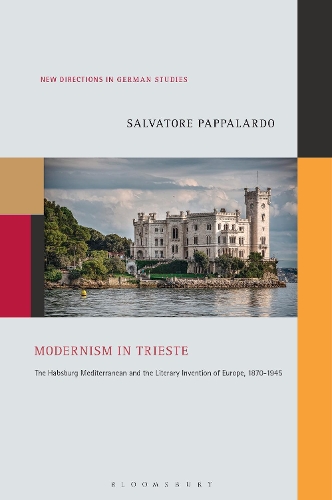
Modernism in Trieste: The Habsburg Mediterranean and the Literary Invention of Europe, 1870-1945
(Hardback)
Available Formats
Publishing Details
Modernism in Trieste: The Habsburg Mediterranean and the Literary Invention of Europe, 1870-1945
By (Author) Dr. Salvatore Pappalardo
Bloomsbury Publishing PLC
Bloomsbury Academic USA
11th February 2021
United States
Classifications
Tertiary Education
Non Fiction
Literary studies: c 1900 to c 2000
809.9112
Physical Properties
Hardback
280
Width 140mm, Height 216mm
472g
Description
When we think about the process of European unification, our conversations inevitably ponder questions of economic cooperation and international politics. Salvatore Pappalardo offers a new and engaging perspective, arguing that the idea of European unity is also the product of a modern literary imagination. This book examines the idea of Europe in the modernist literature of primarily Robert Musil, Italo Svevo, and James Joyce (but also of Theodor Dubler and Srecko Kosovel), all authors who had a deep connection with the port city of Trieste. Writing after World War I, when the contested city joined Italy, these authors resisted the easy nostalgia of the postwar period, radically reimagining the origins of Europe in the Mediterranean culture of the Phoenicians, contrasting a 19th-century nationalist discourse that saw Europe as the heir of a Greek and Roman legacy. These writers saw the Adriatic city, a cosmopolitan bazaar under the Habsburg Empire, as a social laboratory of European integration. Modernism in Trieste seeks to fill a critical gap in the extant scholarship, securing the literary history of Trieste within the context of current research on Habsburg and Austrian literature.
Reviews
Pappalardos book is one of the most innovative and multidisciplinary works to have been written about Trieste ... A precious addition to both comparative and modernist studies. * Comparative Critical Studies *
This is a brilliant and insightful study of modernist literature and politics unified by the complex culture of Trieste. Having previously read the works by Magris, Musil, Joyce, and Svevo that Pappalardo analyzes, I found many of his observations so revelatory that I hope to return to these authors in the future. I can think of no greater praise for a book of literary criticism. * Italian Quarterly *
It would be hard to overstate the timeliness of a work that explores the literary invention of Europe at a time when the very question of what it means to be, or who gets to be, European has come under such renewed pressure. That is what Salvatore Pappalardos Modernism in Trieste does: casting its net over a period that stretches from the fin de sicle to the Second World War, Modernism in Trieste interrogates how literary modernism invented a united, nonnational Europe avant la lettre. ... Modernism in Trieste is a long overdue intervention in the field, restoring this peripheral city to its place of merit among other capitals of modernism in modernist studies. ... The book can therefore be of value to scholars in Modernist, Mediterranean, and Habsburg studies alike so many, and so varied, are indeed the disciplinary threads that Pappalardo deftly interweaves. * Oxford Comparative Criticism & Translation *
Modernism in Trieste is a thoroughly enjoyable read, pulling together a diverse cast of characters and illuminating the Habsburg legacy for European consciousness from a stimulating range of ethic, national, cultural and linguistic perspectivesAustrian, German, Italian, Slavic, Jewish and even Irish. Pappalardo succeeds admirably in his stated goal of reclaiming Trieste for Austrian and Habsburg studies ... It will be read profitably by all those interested in thinking creatively about the Habsburg legacy for Europe. * Journal of Austrian Studies *
Compelling and original. * Annali d'Italianistica *
In this highly inventive and refreshing book, Pappalardo does much to unsettle the common terms and categories that have defined most thinking about Europe. He follows the underexplored and unique history of Trieste, a city that reads like a palimpsest of most every force, ideology, community, and invasion of European history since antiquity. Pappalardo masterfully replots the ways we think about modernist and avant-garde writing in the twentieth century. The familiar axes for thinking about Europe matter less, and the periphery is more than a feeder for major sites, as Trieste becomes a clash of irreconcilable human stories thatPappalardo revealsalmost had to yield radical aesthetic experimentation. * Gayle Rogers, Professor and Chair of English, University of Pittsburgh, USA *
Salvatore Pappalardos Modernism in Trieste offers a compelling and creative re-imagining of Central Europe, uncovering the centrality of Phoenician myths of Europa to the core of literary modernism in Trieste. It transcends the nationalist paradigm to render non-national accounts of Central Europe legible by reclaiming a thalassologic past of Phoenician origin, recounted in literary visions of the Habsburg Mediterranean. Tracing the literary currents of Svevo, Musil, Joyce, Magris and others running through Trieste, the innovative approach at once challenges the predominance of German landedness at the heart of Central European studies and reorients literary modernism in Adriatic, Italian, and Central European studies, emphasizing Phoenician rather than Greco-Roman roots in the Habsburg literary legacy. * Maura Hametz, Professor of History and Academic Unit Head, James Madison University, USA *
Salvatore Pappalardos superb Modernism in Trieste brings together major discourses on the Mediterranean, Europe, the Austro-Hungarian Empire, Orientalism, Classicism, and Modernism, through the important prism of Trieste and its literatures. Focusing on Robert Musil, Italo Svevo, and James Joyce, Pappalardo both examines how these authors literary imagination challenged xenophobic nationalism and sheds new light on their works. Concentrating on the development of modernism from 1870-1945, his sophisticated analysis of the ambiguities of the rhetoric about European cosmopolitanism provides a rich new historical context for this important topic. * Saskia Ziolkowski, Assistant Professor of Romance Studies, Duke University, USA *
Author Bio
Salvatore Pappalardo is Associate Professor of English and Comparative Literature at Towson University, USA, where he teaches courses that range from the ancient Mediterranean to modern world literature. His research interests include nineteenth- and twentieth-century European literature, Austrian and Italian modernism, and Mediterranean Studies.
